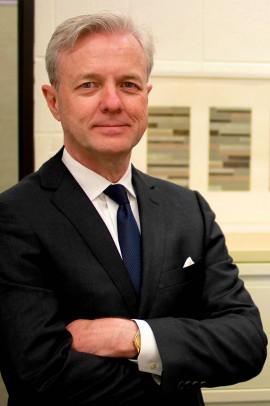Hitting the right notes with technology

Steve Everett: “I build a structural model, and the computer helps me realize the piece based on that structure.” Photo: Muhammad Nafisur Rahman
The chemical origins of life.
A young prostitute who lived in New Orleans’ notorious Storyville 100 years ago.
These are some of the inspirations for Steve Everett’s work in sound and music.
Everett, new dean of the College of Architecture, Design and the Arts, is a prolific composer whose works have been performed in 27 different countries throughout Europe, Asia and North America.
He came to UIC last summer from Emory University in Atlanta, where he presented more than 200 works of contemporary music as conductor of Thamyris New Music Ensemble.
“A lot of what I do is algorithmic composition” with the help of a computer, said Everett, professor of music.
“I don’t have to decide the next note. It’s based on the parameters I put in. I build a structural model, and the computer helps me realize the piece based on that structure.”
He recently finished “First Life,” commissioned by the Center for Chemical Evolution to commemorate the emergence of the first microorganisms, 3.5 billion years ago.
“The question is, how did that happen? How did it move from inorganic chemistry to organic chemistry?” Everett said.
“I was asked to produce a musical performance to help explain that — something that would be true to the science but also be a performance that had aesthetic qualities and be educational.”
He took a biochemical research data stream and routed it into a keyboard.
“I listened to pitches, with the data determining where the notes are,” he said.
The result was a 75-minute composition with a string quartet, narration, live audio processing, surround-sound diffusion and live motion-capture video projection.
Another Everett composition is “Ophelia’s Gaze,” a chamber opera based on Bellocq’s Ophelia, by Natasha Trethewey, U.S. poet laureate and Emory professor.
“The poems are based on imagined thoughts and perceptions of a young prostitute in New Orleans,” a mixed-race woman named Ophelia photographed by E.J. Bellocq in 1912 in the red-light district of Storyville.
Everett is also working on a nonmusical project with Jeffrey Loeb, head of the department of neurology and rehabilitation in the College of Medicine. It involves EEG mapping of rats’ brains to study epileptic seizures.
“We’re looking at the impact of sound triggers,” Everett said. “We want to understand if sound can be an inhibitor of epidemic seizures. Maybe there can be a sonic treatment for human seizures.”
Everett has been a visiting professor of composition at Princeton and a guest composer at Eastman School of Music, Conservatoire National Supérieur de Musique de Paris, Conservatoire de Musique de Genève in Switzerland, Rotterdam Conservatory of Music and Utrecht School of the Arts in the Netherlands.
His compositions have been performed in Paris, Amsterdam, Singapore, Seoul, London, Cologne, Tokyo and New York City (including Lincoln Center and Carnegie Hall).
A native of Atlanta, he has a bachelor’s and two master’s degrees — in music theory and trumpet performance — from Florida State University, and he earned a Doctor of Musical Arts degree from the Urbana-Champaign campus.
Everett started out as a math major, with the idea of becoming an architect or engineer, but his love for the trumpet, double bass and Javanese gamelan intervened.
“In my second year of college, every day I was playing one of the three for five, six hours,” he said. “And every day I noticed that my music got larger and my calculus less, so I changed my major to music.”
Everett taught at Kennesaw State University, near Atlanta, for 13 years. At Emory, where he spent 25 years, he started a computer music studio, chaired the music department and served as interim director of the Fox Center for Humanistic Inquiry, chair of the Faculty Council and president of the university senate.
He also played trumpet for the Atlanta Symphony.
Along the way, he has studied indigenous music in Bali, Java and India.
Everett’s appointment as UIC dean became official Aug. 1. He lives in Streeterville, while his wife, Yayoi, who does music analysis, remains in Atlanta, where she is finishing up a research project and putting their house on the market.
When she rejoins Everett, she’ll teach in the department of theatre and music.
“As a composer, I’m always looking for ideas as the impetus for creating some kind of patterns of sounds to generate,” he said. “So I read a fair amount of poetry and look at a lot of paintings. I’m looking for any kind of source that might resonate with me at some level.”
Performances of some of Everett’s recent compositions are available on his website.
